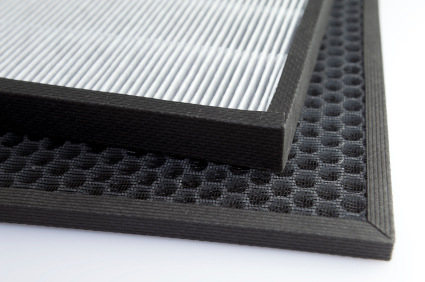MERV, or Minimum Efficiency Reporting Value, are used to rate the ability of a filter to remove dust from the air as it passes through the filter. MERV is a standard used to measure the overall efficiency of a filter. Higher MERV ratings mean fewer dust particles and other airborne contaminants pass through the filter.
MERV ratings are determined by adding particles of varying sizes(1-12) into a controlled testing environment. The particles are added upstream of the test filter and a laser particle counter samples the air before it enters the filter and after it leaves the filter. The two particle counts are compared to calculate the Particle Size Efficiency of the tested filter. Once this is determined, a MERV Parameter chart is used to determine the MERV rating. MERV ratings range from 1-16 and measurements are in microns. Some of the common particles related to MERV ratings are pet dander, insecticide dust, smog, dust, viruses, wood, tobacco smoke, spores, bacteria, and pollen.
Some of the most common filters found in residential use only have a MERV ratings of 1 to 4. These are typically disposable panel type filters and do not do as good job of filtering the air because they will not stop particles smaller than 10 microns. MERV 5 to 8 rated filters are a better choice and are more commonly found in commercial applications. These filters will collect particles as small as 3 microns and we believe are good choice for home owners also. Filters with a MERV rating of 9 to 12 are used in commercial and who want the best dust control possible.
When using filters with MERV 9 ratings and above it is important to clean or replace them when recommended by manufacturer and checked monthly because they will have a negative effect on air flow when they become dirty. This can lead to performance problems and decreased operating efficiency.
The most efficient filters have MERV ratings of 1 to 16 and will stop particles as small as .3 microns. These filters are used in hospitals and other sterile environments.

